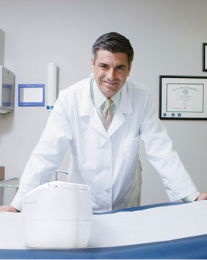If you or someone you love has been diagnosed with cystic fibrosis, you may be wondering, “What is cystic fibrosis, exactly?”
Cystic fibrosis (CF) is a progressive, genetic disease that affects the lungs, pancreas, and other organs. In people with CF, mutations in the CFTR gene (cystic fibrosis transmembrane conductance regulator gene) cause the CFTR protein to not work correctly. As a result, chloride – a component of salt – is unable to attract water to the cell surface. Without chloride, excess, thick mucus begins to form inside the lungs, pancreas and other organs. When this mucus forms in the lungs, it blocks the airways, making breathing difficult, and trapping germs and bacteria inside the lungs. The trapped germs and bacteria often lead to respiratory infections and inflammation, eventually damaging the lungs. Cystic fibrosis also affects the gastrointestinal tract, and can even cause infertility in men. It is a serious, life-threatening disease that requires treatment.[1,2]
Cystic Fibrosis Causes and Risk Factors
Know your cystic fibrosis facts. About 40,000 people in the United States are living with CF and about 1,000 new cases will be diagnosed each year. More than 75% of those with the disease are diagnosed by age two.[1]
The origin of cystic fibrosis is genetic in nature and requires two abnormal CF genes. Sometimes cystic fibrosis occurs without a known family history because anyone with a single abnormal CF gene is a carrier. If two carriers have a child, chances are:[1]
- 25% that the child will have CF
- 50% that the child will be a carrier
- 25% that the child will not be a carrier or have CF
While it is an inherited disease, there are also risk factors that can affect the severity of the disease. Here are some cystic fibrosis facts and risk factors to consider. [2]
- Genes: CF gene mutations are divided into classes based on how damaged the CFTR protein function is. Classes I, II and III are generally more severe causing “classic CF.” Classes IV and V are usually milder. Also, other genes called modifier genes can affect a person’s symptoms and outcome.
- Environment and lifestyle: People with CF need to consume a very large number of calories to maintain weight and grow, which can be difficult to achieve. Physical activity is also important to help keep lungs healthy. People with CF should not smoke or be exposed to secondhand smoke, as it will worsen lung disease. You should also be careful with alcohol intake and avoid it altogether if you have liver disease.
- Age: CF worsens with age. If you have CF, you usually experience a small decline in lung function each year.
Cystic Fibrosis Symptoms
It is helpful to be familiar with cystic fibrosis symptoms if it runs in your family, though the severity of the symptoms varies from person to person.[1]
Symptoms of CF can be classified into two main categories: respiratory and digestive.
The most common symptoms of CF respiratory tract disease are:[1,2]
- Chronic coughing (dry or coughing up mucus)
- Frequent lung infections, including pneumonia or bronchitis
- Wheezing or shortness of breath
- Frequent sinus infections
- Very salty-tasting skin
Digestive symptoms may include: [1,2]
- Chronic coughing (dry or coughing up mucus)
- greasy, foul-smelling bowel movements,
- severe constipation or intestinal blockage and
- the inability to gain weight while being constantly hungry.
Symptoms of lung disease can start in infancy, especially following upper respiratory viral infections. People with CF experience a small but progressive (worsening) loss in lung function with every passing year, leading to increased symptoms as you age. Some children remain relatively healthy throughout childhood and only start to experience a decline in their lung function when they are teenagers.[2]
If you are diagnosed with cystic fibrosis, follow your doctor’s recommendations in order to stay as healthy as possible.
Cystic Diagnosis and Treatment
Diagnosing cystic fibrosis is a multistep process and should include a: [1]
- Newborn screening
- Sweat test
- Genetic or carrier test
- Clinical evaluation at a CF Foundation-accreditied care center
Although most people are diagnosed with CF by the age of 2, some are diagnosed as adults. A CF Specialist can order a sweat test and recommend additional testing to confirm a CF diagnosis. There is no cure for cystic fibrosis, but there have been many advances in CF treatment.[1] It is essential to stay as healthy as possible. Your health care providers will assess the severity of your cystic fibrosis, as well as assessing your overall health, before choosing your ideal treatment plan.[1]
In most cases, cystic fibrosis treatment includes the following:
- Airway clearance therapy: ACT therapy shakes or vibrates the mucus in the airways manually, with the help of a VEST device or with a portable “flutter” device, enabling the patient to cough up the mucus and clear their airway[2]
- Antibiotics: frequently needed to treat bacteria that grow in the mucus. These can be given in one of three ways:[2]
- Orally or by mouth – this is the easiest and cheapest route.
- By inhalation – this is more expensive but very effective.
- Intravenously (IV) – this is usually reserved for those who are sicker.
- Anti-inflammatory medication: – Two medications are currently in use, azithromycin (an antibiotic that’s used as an anti-inflammatory agent in CF), and ibuprofen.[2]
- Mucus-thinning medication:Helps mucus to be cleared with ACT, usually provided via inhaler or nebulizer[1]
- Oxygen therapy:It is common for doctors to prescribe this treatment for people with CF when there is not enough oxygen in their blood.[3]
- Pancreatic enzyme replacement therapy:Helps the body properly absorb the nutrients from food[1]
- Salt replacement: Additional salt needs to be provided in formula or food.[2]
How Inogen Can Help
If your doctor decides that supplemental oxygen will help ease your cystic fibrosis symptoms, ask if a portable oxygen concentrator is right for your oxygen therapy. Inogen’s portable oxygen concentrators are small and lightweight, allowing you to get your oxygen treatments at home or on the go. Short term, supplemental oxygen has shown some improvement in blood oxygen levels in people with CF during sleep and exercise[3], so a portable oxygen concentrator could be used for both purposes.[4] Speak with your doctor and contact Inogen today to find out more about how Inogen oxygen concentrators may help.
Note: Use of this device has not been studied in pediatric populations. Please discuss treatment options with your healthcare provider.
References
- https://www.cff.org/What-is-CF/About-Cystic-Fibrosis/
- https://www.lung.org/lung-health-diseases/lung-disease-lookup/cystic-fibrosis/learn-about-cystic-fibrosis
- https://www.cochrane.org/CD003884/CF_additional-oxygen-in-the-treatment-of-cystic-fibrosis
- Emtner M, Porszasz J, Burns M, Somfay A, Casaburi R. Benefits of supplemental oxygen in exercise training in nonhypoxemic chronic obstructive pulmonary disease patients. Am J Respir Crit Care Med. 2003 Nov 1;168(9):1034-42. doi: 10.1164/rccm.200212-1525OC. Epub 2003 Jul 17. PMID: 12869359; www,atsjournals.org/doi/full/10.1164/rccm.200212-1525OC










